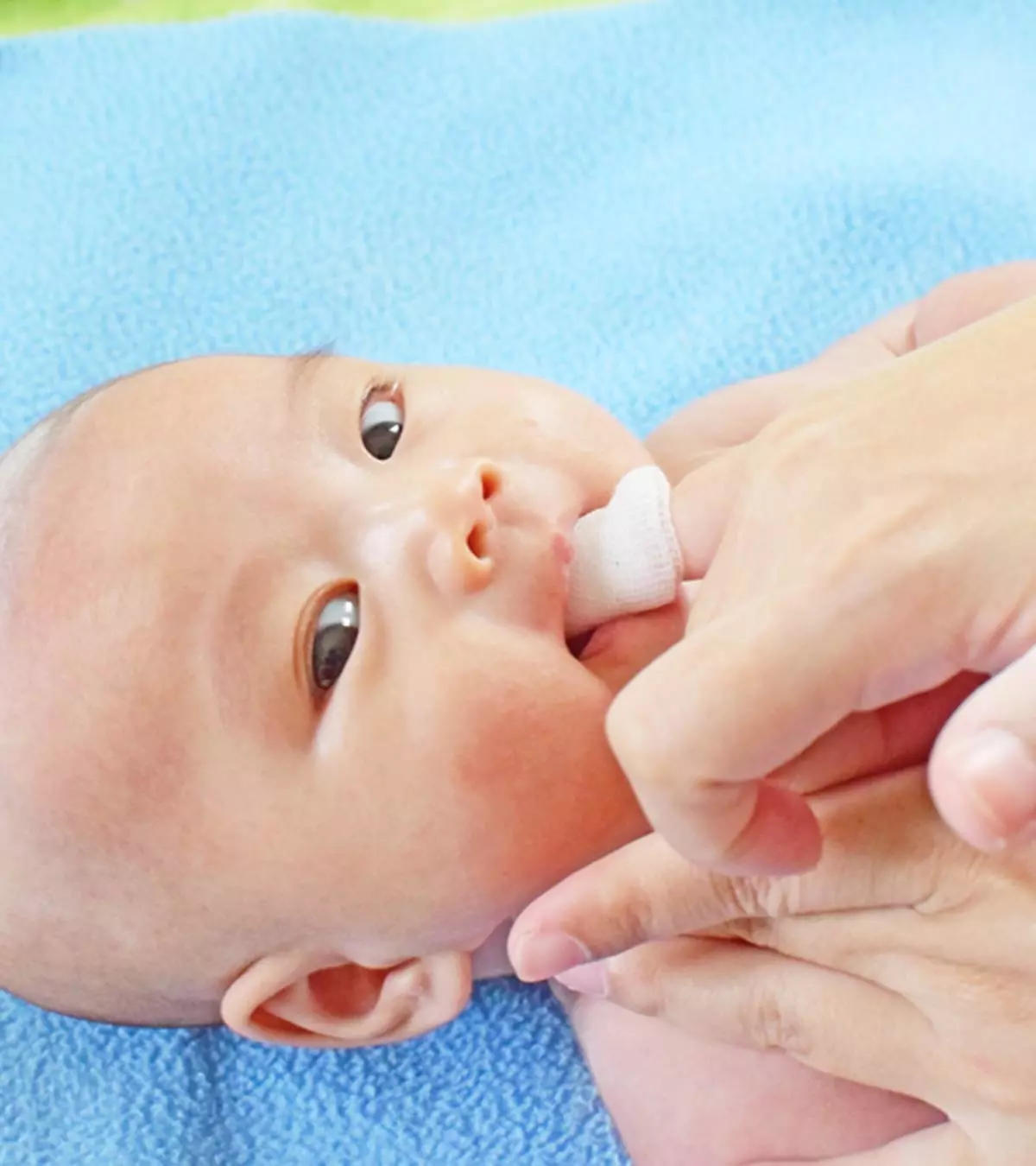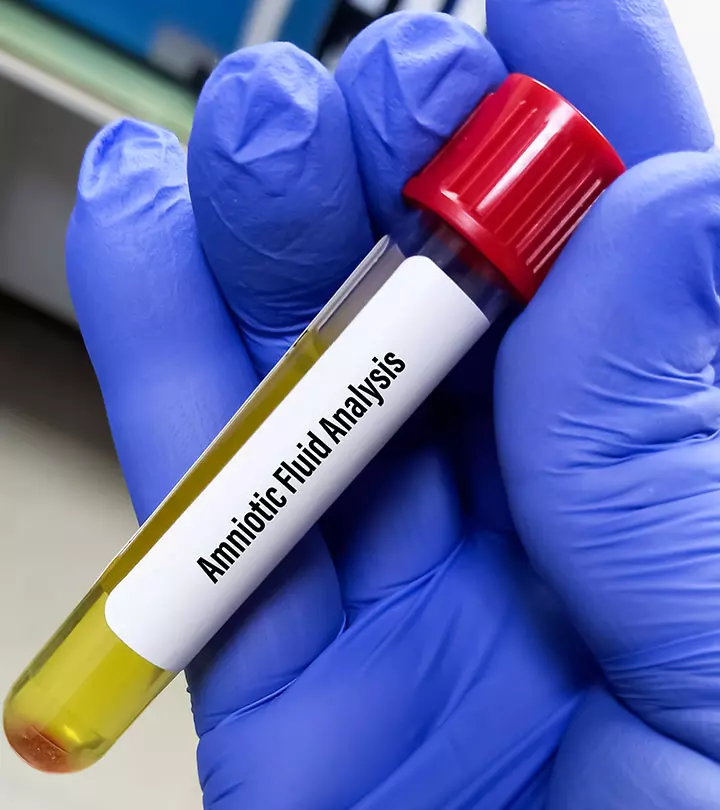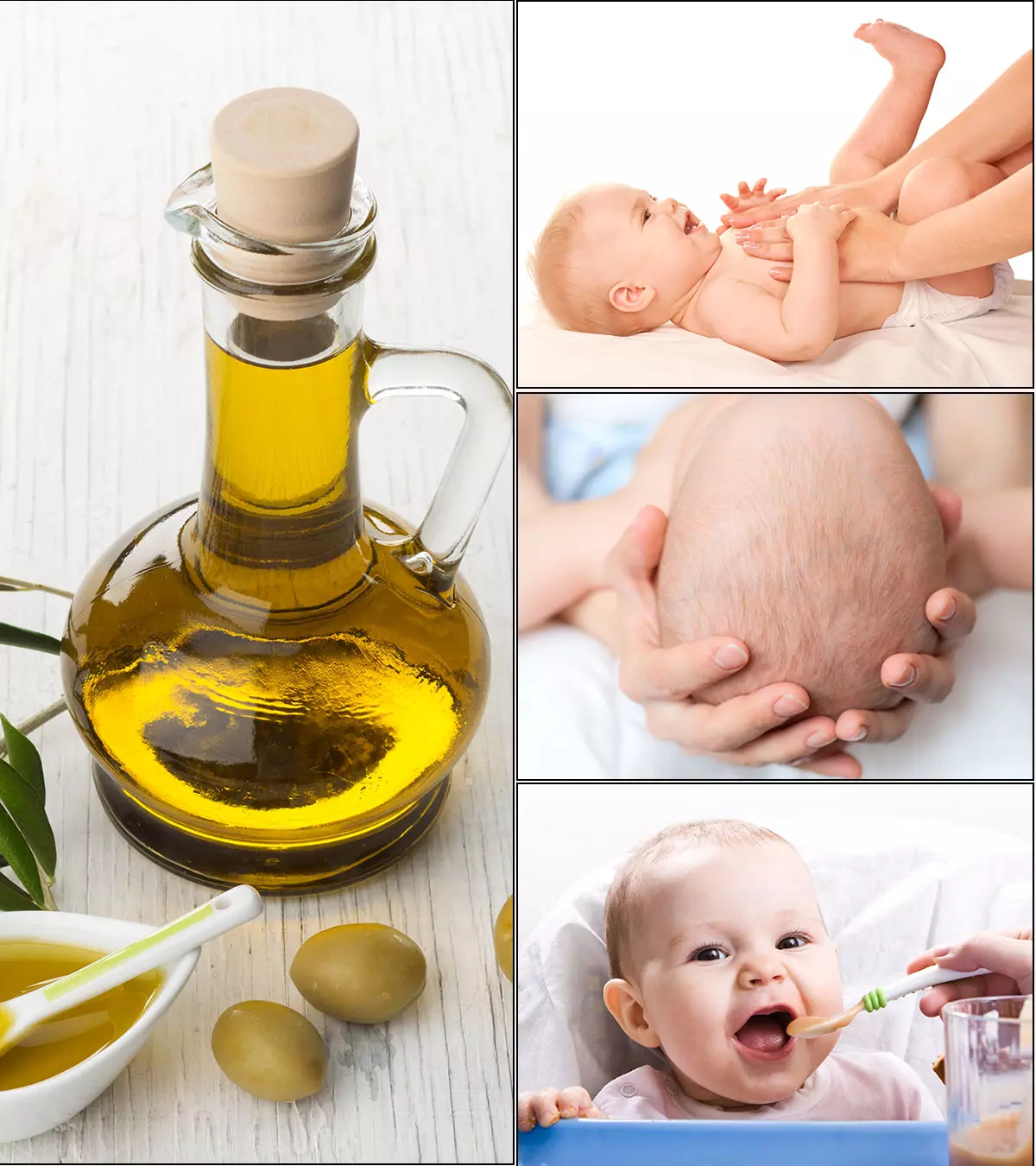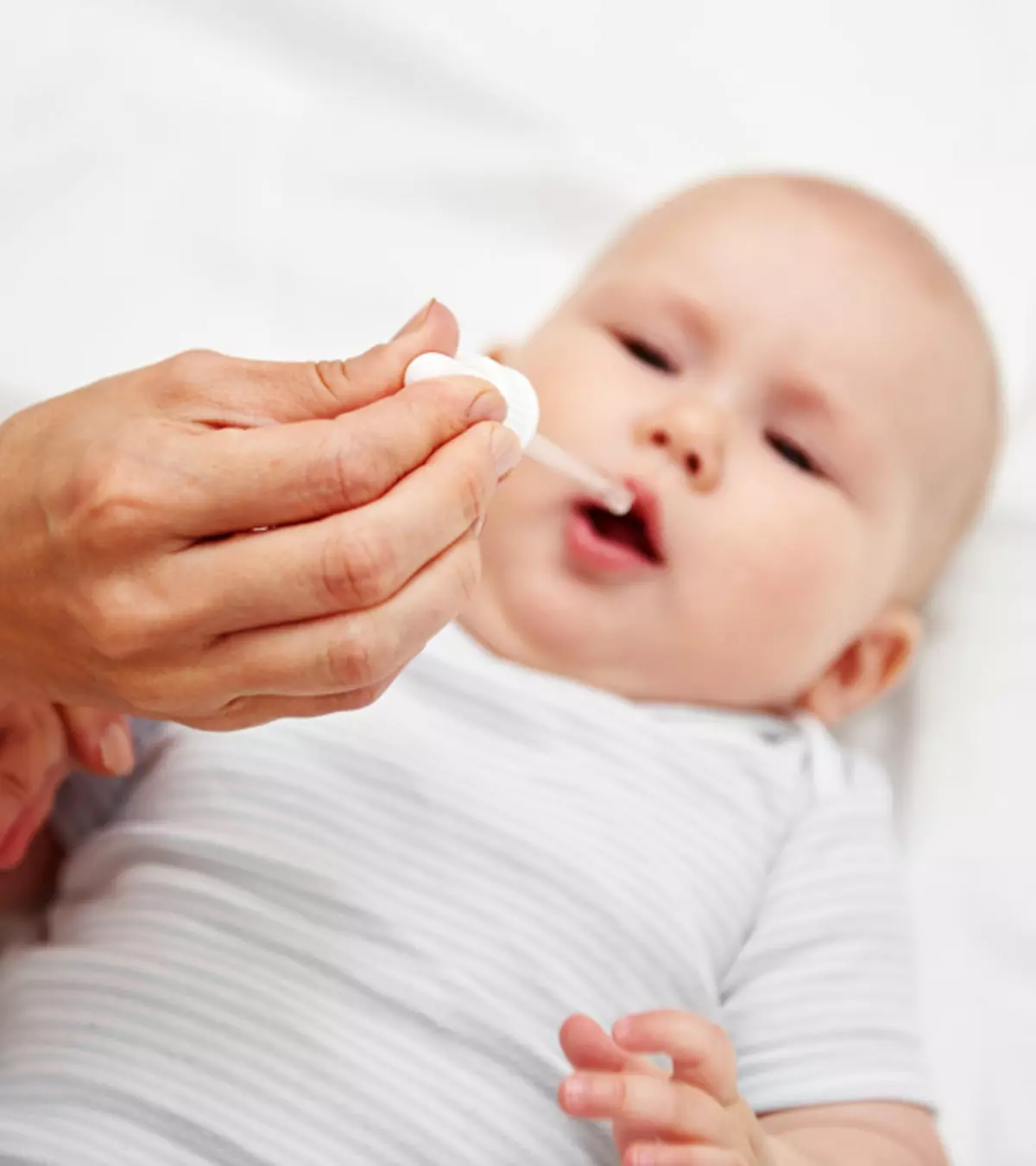
Image: Shutterstock

A sore throat in babies and other people could suggest a cold or other illness. It is typically the first symptom of a throat infection. However, because babies cannot articulate their problems, parents may not be able to detect the condition right away. Identifying early signs allows for prompt action, helping maintain the baby’s well-being and comfort. One indicator to check for the symptom is if your baby refuses to eat or drink because they have a sore throat and throat pain (1).
Read this post to know about various causes of sore throat in newborns, how to treat it, and the preventive measures for the condition.
Key Pointers
- A sore throat in babies can be caused by viral or bacterial infections, exposure to irritants, or allergies.
- Symptoms of sore throat in babies include pain or discomfort while swallowing, cough, drooling, crying while eating, and a hoarse voice.
- Home remedies for a sore throat include sipping warm water, eating warm broth, and drinking plenty of fluids.
- Installing a humidifier at home, keeping the surroundings clean and cleaning the baby’s nose regularly may help ease their discomfort.
- If the baby displays other symptoms like fever and vomiting, it is advisable to consult a doctor.
What Causes Sore Throat In Babies?
A sore throat could be a symptom of various conditions. Here are the most common ones:
- Viral infections are the leading cause of a sore throat in babies (2). A plethora of viruses can cause it, but the common ones are the cold virus, adenovirusiViruses that cause respiratory illnesses. , influenza (flu) virus, coxsackievirusiA virus that is the main cause of hand, foot, and mouth disease. , and herpesiRash or blisters on the body caused by a virus that can spread from a person with a cold sore to a baby. virus (3) (4) (5). Some viral infections that could cause a sore throat are the common cold, flu, tonsillitis, hand, foot, and mouth disease, bronchitis, or laryngitis.
- Bacterial infections are caused by Streptococcus (strep throat) and Corynebacterium diphtheriae (diphtheria) (6) (7). Both lead to a severe sore throat. Strep throat is one condition that can cause a sore throat due to bacterial infections in babies. Furthermore, the migration of strep throat-causing bacteria to the lungs may lead to pneumonia.
 Quick fact
Quick fact- Allergies caused by inhalation of potential allergens such as pollens, particles of wheat flour, or molds, could lead to congestion and an itchy and sore throat. An allergy, where the sore throat is quite common, is called allergic rhinitisiAn inflammation of the inner lining of the nose caused by allergens. (8).
- In gastroesophageal reflux disease, the baby’s poorly developed lower esophageal sphincteriA band of muscle present at the place where the esophagus meets the stomach. does not close properly. The stomach acids and other contents flow upwards as far as the throat and cause constant irritation to the throat, leading to chronic sore throat (9).
- Smoke and pollution, such as suspended air particles, affect the baby’s delicate throat lining and eventually cause a sore throat.
- Adenoids and enlarged tonsils are referred to as tonsillitis which may lead to sore throat accompanied with trouble in swallowing or an inner ear infection among children (10).
The sore throat in infants could easily be spotted by a parent.
Excessive mucus discharge and red blisters around the mouth and parts of the body indicate the need for prompt medical intervention.
What Are The Symptoms Of A Sore Throat?
Here is what to look out for when you think that the baby has a sore throat (11) (12).
- Redness on the inside of the throat: Every time the baby opens the mouth to eat or cry, you notice a dark-red hue at the back of the mouth where the throat begins.
- Difficulty swallowing: The baby has trouble taking solid food or breastmilk. There is a sudden aversion towards eating, and when the baby is hungry, they stop eating midway due to the pain while swallowing.
A mother of a baby girl, Karen details in her blog how her daughter refused to feed after she was diagnosed with a sore throat due to an infection in her ears. She says, “That morning in the doctor’s office was the last time she nursed. I don’t know if it was the stuffy nose, ear pain and pressure, or a sore throat, but from that morning on she refused to nurse at all. She would arch her back, push me away, and scream.
She adds, “We’ve settled on a medicine cup as the most effective way of getting any fluids into her, which is a bit of a slow process and certainly not one she can do herself as she could if she would take to a sippy cup or bottle. But she has shown no interest in nursing again. She continues to strenuously resist even being in a nursing position. She gets upset if I even begin to lift my shirt when she’s on my lap. So I’m accepting that what I hoped would be a nursing strike is probably going to be a sudden weaning (i).”
- White patches on the tonsils: Infected tonsilsiOval-shaped tissue pads at the back of the mouth and the top of the throat. develop white spots that ooze pus. Pus is made of white blood cells that defend the body against pathogensiOrganisms like bacteria, fungi, and virus that causes various infections and diseases. . And, the presence of pus indicates an infection.
- Swollen neck: Inflammation is noticed from the outside, as the baby’s lymph nodesiThe nodes present at different locations in the body as a part of the lymphatic system for filtering the substances passing through and manufacturing lymphocytes. are swollen.
- Hoarse voice: Older infants who can speak a bit may experience hoarseness and speak in a muffled tone due to inflammation of the tonsils.
- Cough: The irritation caused by a sore throat can repeatedly cause cough in babies.
Sore throat is usually a benign condition, but if the cause is bacterial, then can lead to severe complications
. If you have a young baby or toddler or if your child has fever or other complaints along with the sore throat, then speak to your doctor.
Home Remedies For Sore Throat In Babies
Home remedies could be a good way to alleviate the discomfort caused by a sore throat. Here is what you can do to make the baby feel better.
- Give sips of warm water. The American Academy of Pediatrics (AAP) recommends this home remedy for babies aged three months and older (13). Heat drinking water until it is warm enough to swallow comfortably. Give 5-15ml of water about four times a day as it relieves itchy, sore throat symptoms, and inflammation.
- Clean the baby’s nose if they have a runny nose and ensure that you clean the baby’s nose frequently. This is important as the baby will not be able to do that themselves (13). You may also use suction via a bulb syringe to clean the baby’s nose.
 Quick tip
Quick tip- Give a warm broth made of chicken or vegetables, to infants older than six months. Cook vegetable or chicken broth, cool it until it is warm, and then feed to the baby (14).
- Provide adequate fluids and breastfeed more than normal to babies below six months to soothe the throat irritation. Babies older than six months should be given a lot of fluids to calm the soreness. Feed diluted purees, broths, and stocks. Do not give fruit juice as it is not helpful and offers no nutritional benefits (15).
- Frozen liquids or cold foods like popsicles or ice cream could be given to a baby (older than six months) to soothe a sore throat (16).
- Install a humidifier in the infant’s room to maintain ideal water vapor levels. Dry air can irritate the baby’s sore throat, and optimum humidity relieves irritation. Use a cool-mist humidifier and not hot-water/steam vaporizers as they increase the risk of nasal burns (16).
- Chamomile tea can be introduced to babies over six months, but it’s safer after one year when the risk of food allergies decreases. Always consult your pediatrician before offering it. If approved, start with small amounts and watch for any signs of allergies. Herbal teas like chamomile can help soothe throat discomfort, but only under professional guidance (17) (18).
 Caution
CautionPediatric experts recommend against the usage of infant throat syrups and lozenges since they do not provide many benefits(11). Remember, if your baby is younger than three months, then do not try any medicines or home remedies without pediatric consultation. It is therefore wise to consult a doctor right away for treatment. treatment.
When To See A Doctor?
Take your baby to the doctor right away if a sore throat is accompanied by (16):
- Fever
- Diarrhea
- Vomiting and nausea
- Excessive mucus discharge from the nose
- Red blisters around the mouth and parts of the body
- Dizziness
- Blood in saliva or phlegm
- Poor appetite
A doctor would arrive at conclusive results only after running a thorough diagnosis of the baby’s condition.
How Is Sore Throat In Babies Diagnosed?
The process involves one or more of these methods, depending on the severity of the condition:
- Physical examination: The doctor checks for redness and inflammation inside the baby’s throat while looking for pus on the tonsils. Parents are also asked questions to know if the baby has trouble breastfeeding and sleeping.
- Throat swab: A sterile swab is run across the baby’s tonsils and the collected mucus is tested for the presence of a pathogen.
- Blood test: A blood test might help in accurate detection of the underlying pathogen.
Diagnosis reveals the actual cause of the sore throat, paving the way for the appropriate treatment.
How To Treat Sore Throat In Infants?
A sore throat usually does not require treatment and cures by itself (19). A doctor may, however, prescribe medications to treat the underlying condition. Antibiotics are prescribed if the sore throat is caused by bacteria. Viral infections seldom require medication since symptoms lose their intensity in a week to ten days.
Experts recommend avoiding medication for sore throat in infants unless the problem is severe (20).
How Long Does Sore Throat Last?
It depends on the disease or infection that led to the problem. A sore throat caused by the common cold may resolve in a couple of days, but one due to herpes may take several weeks. Therefore, you must look for ways to prevent your baby from getting a sore throat. Read the next section to know how!
How To Prevent Sore Throat In Babies?
It is quite simple to keep a sore throat at bay. Here is what you must do (19).
- Protect from pathogens: Maintain hygiene around the baby by keeping the surroundings clean. Clean toys and the baby’s little hands regularly as infants tend to put toys and hands in their mouths. Wash your hands before holding the baby and handling their personal items. If a family member, including a baby’s sibling, has a cold or fever, then keep the baby away from that individual till the person cures. These steps help in minimizing the risk of an infection that could eventually lead to a sore throat.
- Be watchful of allergies: Stay alert to any symptoms that could point to allergies. Timely detection of allergies helps you shield the baby from the allergen that could cause a sore throat. According to the National Center for Health Statistics 2025 data, seasonal allergy affected 10.4% of children between zero and five years. On the other hand, food allergy affected 4.4% of children in that age group.
- Keep the air around the baby clean: Dust, smoke, and other airborne pollutants can lead to a sore throat. Close the windows in the house when it is dusty outside. Avoid taking a newborn to places where the air is polluted with automobile exhaust.
A sore throat could be a source of misery for an infant, but it is also a condition that is easily preventable. If the baby gets a sore throat, easy home remedies can help them feel better.
Frequently Asked Questions
1. Can a baby get a sore throat from teething?
There is no evidence that links teething and sore throat in babies.
2. Can I pass strep throat to my baby?
Yes. Strep throat is a contagious infection your baby may contract via respiratory droplets that spread when you talk, cough, or sneeze (23).
3. Can a baby have a sore throat without a fever?
Pediatrician Dr. Kristen Cook from the Greater Chicago Area says, “Viral Infections are a common cause of sore throats in children, and these illnesses may or may not involve a fever. A sore throat caused by a viral infection will resolve within a week. Over-the-counter pain medications such as acetaminophen or ibuprofen may be helpful, though ibuprofen should not be used in infants under six months of age.”
Infographic: What Should You Not Do For Cough In Babies?
Cough in babies can be overwhelming for parents and caregivers. Many parents may think of OTC syrups and remedies for babies. However, it can do more harm than good. Go through the infographic to learn things to avoid while caring for your baby with a cough.
Some thing wrong with infographic shortcode. please verify shortcode syntax
Illustration: Natural Home Remedies To Treat Baby Sore Throat
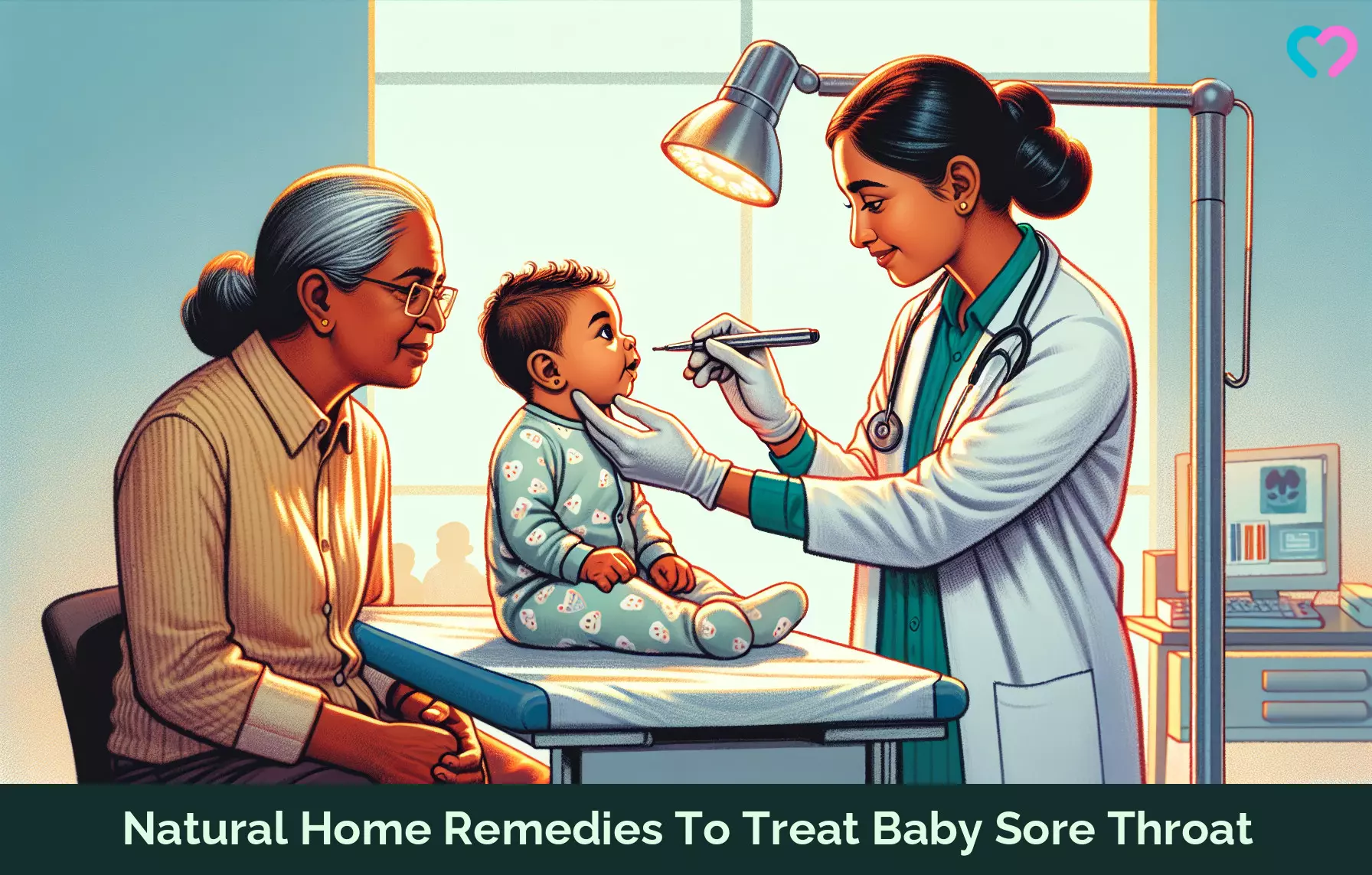
Image: Dall·E/MomJunction Design Team
Learn effective home remedies to provide relief for your baby’s sore throat. Acquire valuable insights on quick techniques that can alleviate their discomfort and promote a speedy recovery.
Personal Experience: Source
MomJunction articles include first-hand experiences to provide you with better insights through real-life narratives. Here are the sources of personal accounts referenced in this article.
i. Mar. 11th, 2009;https://kare43.livejournal.com/147347.html#
References
1. Ear infection and sore throat; About Kids Health
2. The Difference between a Sore Throat, Strep & Tonsillitis; Healthy Children; American Academy of Pediatrics
3. Adenovirus Infections; Healthy Children; American Academy of Pediatrics
4. The Flu; Healthy Children; American Academy of Pediatrics
5. Cold Sores in Children: About the Herpes Simplex Virus; Healthy Children; American Academy of Pediatrics
6. Strep Throat Infection; Symptom Viewer; Healthy Children; American Academy of Pediatrics
7. Diphtheria Symptoms and Complications; CDC
8. Allergic rhinitis: Your nose knows; Harvard Medical School
9. GERD (Gastroesophageal Reflux Disease) in Children; Stanford Children’s Health
10. Enlarged tonsils and Adenoids; Boston Children’s Hospital
11. Sore Throat; Seattle Children’s Hospital
12. When is a Sore Throat a More Serious Infection?; Healthy Children; American Academy of Pediatrics
13. Coughs and Colds: Medicines or Home Remedies?; Healthy Children; American Academy of Pediatrics
14. Home remedies to soothe your child’s cold symptoms; American Academy of Pediatrics
15. AAP Recommends No Fruit Juice for Children Under 1 Year; American Academy of Pediatrics
16. When to worry about your child’s sore throat; Harvard Medical School
17. Complementary, Holistic, and Integrative Medicine; American Academy of Pediatrics
18. Sore Throat Basics; CDC
19. Why Most Sore Throats, Coughs & Runny Noses Don’t Need Antibiotics; Healthy Children; American Academy of Pediatrics
20. Mohammad Reza Sharif et al.; Streptococcal Pharyngitis in a Two-Month-Old Infant: A Case Report; NCBI
21. Suctioning the Nose with a Bulb Syringe; Nationwide Childrens’ Hospital
22. Coughs and Colds: Medicines or Home Remedies?; Healthy Children; American Academy of Pediatrics
23. Strep Throat?; Cleveland Clinic
Community Experiences
Join the conversation and become a part of our nurturing community! Share your stories, experiences, and insights to connect with fellow parents.
Read full bio of Dr. Wayne Hough
- Dr. Kristen Cook is a board-certified pediatrician with a medical practice in Southeastern Wisconsin. She attended the Creighton Medical School in Omaha, Nebraska, and completed a three-year pediatric residency at Children's Hospital of Wisconsin. She has been in clinical practice at Ascension All Saints since 2010.
 Dr. Kristen Cook is a board-certified pediatrician with a medical practice in Southeastern Wisconsin. She attended the Creighton Medical School in Omaha, Nebraska, and completed a three-year pediatric residency at Children's Hospital of Wisconsin. She has been in clinical practice at Ascension All Saints since 2010.
Dr. Kristen Cook is a board-certified pediatrician with a medical practice in Southeastern Wisconsin. She attended the Creighton Medical School in Omaha, Nebraska, and completed a three-year pediatric residency at Children's Hospital of Wisconsin. She has been in clinical practice at Ascension All Saints since 2010.
Read full bio of Rohit Garoo
Read full bio of Dr. Ritika Shah
Read full bio of Anindita Ghatak






